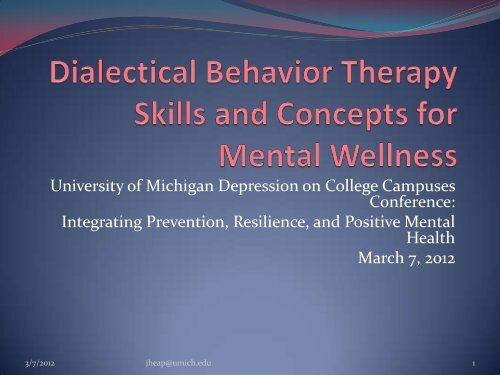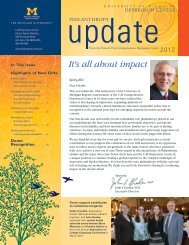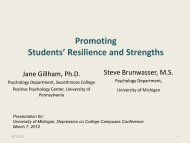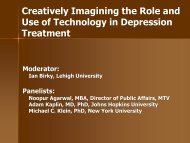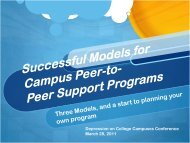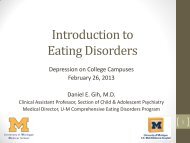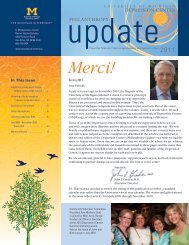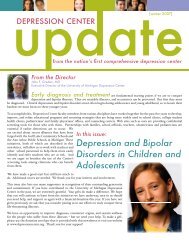Integrating Prevention, Resilience, and Positive Mental Health
Integrating Prevention, Resilience, and Positive Mental Health
Integrating Prevention, Resilience, and Positive Mental Health
Create successful ePaper yourself
Turn your PDF publications into a flip-book with our unique Google optimized e-Paper software.
University of Michigan Depression on College Campuses<br />
Conference:<br />
<strong>Integrating</strong> <strong>Prevention</strong>, <strong>Resilience</strong>, <strong>and</strong> <strong>Positive</strong> <strong>Mental</strong><br />
<strong>Health</strong><br />
March 7, 2012<br />
3/7/2012 jheap@umich.edu<br />
1
Dialectical Behavior<br />
Therapy Skills for<br />
Wellness <strong>and</strong> Coping<br />
JoAnn Heap, LMSW<br />
Director of Dialectical<br />
Behavior Therapy<br />
University of Michigan<br />
Adult <strong>and</strong> Adolescent<br />
Psychiatry<br />
3/7/2012 jheap@umich.edu<br />
2
What is DBT?<br />
• Author, Marsha Linehan PhD<br />
• University of Washington<br />
• Published 1993<br />
• Brought to Washtenaw County in 1992<br />
• Created out of many theories but essentially is a<br />
dialectical cognitive-behavioral approach<br />
3/7/2012 jheap@umich.edu 3
“Dialectics”<br />
• A method of logic or argumentation by disclosing<br />
the contradictions (antithesis)<br />
• in an opponents argument (thesis) <strong>and</strong><br />
• overcoming them (synthesis)<br />
3/7/2012 jheap@umich.edu 4
Dialectical<br />
Acceptance<br />
Change<br />
3/7/2012<br />
jheap@umich.edu 5
3/7/2012 jheap@umich.edu<br />
6
• Dialectical: Two opposing<br />
ideas at the same time.<br />
• One idea does not<br />
necessarily rule out the<br />
other.<br />
• Meaning <strong>and</strong> truth<br />
evolve over time.<br />
• Change is transactional.<br />
• There is more than one<br />
way to see a situation.<br />
• There is more than one<br />
way to solve a problem.<br />
3/7/2012 jheap@umich.edu<br />
7
Our Genetic Sensitivity<br />
3/7/2012 jheap@umich.edu 8
Biology<br />
• The Brain<br />
3/7/2012 jheap@umich.edu 9
Achievement<br />
Professor<br />
Child<br />
• Pride<br />
• Pleasure<br />
• Smiles<br />
• No smiles<br />
• Grocery store<br />
• C<strong>and</strong>y<br />
3/7/2012 jheap@umich.edu 10
Don’t Shoot the Dog<br />
Behavior<br />
Reinforcement<br />
Increased<br />
behavior<br />
3/7/2012 jheap@umich.edu 11
Validation Levels<br />
• 1. Staying awake. Unbiased listening <strong>and</strong> observing.<br />
• 2. Accurate reflection (avoid rolling eyes)<br />
• 3. Observe the unverbalized emotion, thoughts or<br />
behavior. Look for a word that describes the feeling.<br />
• 4. Validation in terms of past learning or biological<br />
dysfunction.<br />
• 5. Validation in terms of present content or<br />
normative functioning.<br />
• 6. Radical Genuineness<br />
jheap@umich.edu<br />
12<br />
3/21/2012
SKILLS !!!<br />
• See<br />
reality as<br />
it is<br />
• Regulate<br />
intensity<br />
Mindfulness<br />
Emotion<br />
Regulation<br />
Distress<br />
Tolerance<br />
Interpersonal<br />
Effectiveness<br />
• Get<br />
through<br />
it<br />
• Get what<br />
you want<br />
3/7/2012 jheap@umich.edu 13
Assumptions about Clients <strong>and</strong><br />
Therapy<br />
People are doing the<br />
best they can<br />
• Philosophical position in DBT<br />
• All People<br />
• Working desperately to change<br />
• Often not successful<br />
People want to<br />
improve<br />
• Check the interfering factors<br />
• Faulty beliefs, reinforcement of regression, deficits, in a<br />
chain analysis<br />
People need to do<br />
better, try harder <strong>and</strong><br />
be more motivated<br />
• Dialectical<br />
• The task of therapy is to identify interference <strong>and</strong> increase<br />
motivation<br />
3/7/2012<br />
jheap@umich.edu 14
Assumptions<br />
We may not have<br />
caused all of our<br />
own problems,<br />
but we have to<br />
solve them<br />
anyway<br />
• One’s behavioral responses<br />
must change <strong>and</strong> one must<br />
change his environment.<br />
•<br />
We must learn<br />
new behaviors in<br />
all relevant<br />
contexts<br />
• Times of stress are time to<br />
learn<br />
3/7/2012 jheap@umich.edu 15
Diary Card<br />
We call it “homework”<br />
Why have HOMEWORK???<br />
Brain functioning<br />
Family Communication Skills<br />
Diary Card/Behavior Changes<br />
Coaching Opportunities<br />
3/7/2012 jheap@umich.edu 16
Mindfulness Breathing Exercise<br />
• Do you have the patience to wait<br />
• Till your mud settles <strong>and</strong> the water is clear?<br />
• Can you remain unmoving<br />
• Till the right action arises by itself?<br />
• (LaoTsu)<br />
3/7/2012 jheap@umich.edu<br />
17
Inhale <strong>and</strong> exhale with the<br />
following phrases said to yourself:<br />
• In Breath: Waiting Patiently<br />
• Out Breath: My Mind Settles<br />
• In Breath: Remaining Still<br />
• Out Breath: Wise Mind Arises<br />
3/7/2012 jheap@umich.edu<br />
18
MINDFULNESS<br />
• Nonjudgmentally<br />
• One mindfully<br />
• Effectively<br />
OBSERVE<br />
DESCRIBE<br />
• Nonjudgmentally<br />
• One Mindfully<br />
• Effectively<br />
• Nonjudgmentally<br />
• One Mindfully<br />
• Effectively<br />
PARTICIPATE<br />
3/7/2012 jheap@umich.edu 19
Emotion Regulation<br />
• What myths?<br />
• Know the flow<br />
• Identify the emotion<br />
• Reduce vulnerability<br />
• Increase positive emotions<br />
• Love your emotions<br />
• Like a wave<br />
• You can act opposite if you want<br />
3/7/2012 jheap@umich.edu 20
Interpersonal Effectiveness<br />
• What makes us ineffective?<br />
• When do you increase intensity?<br />
• Get what you want<br />
• Keep the relationship<br />
• Have self esteem<br />
3/7/2012 jheap@umich.edu 21
Distress Tolerance<br />
• What do you do when you can’t solve the problem <strong>and</strong><br />
you don’t want to make things worse?<br />
• Wise mind accepts<br />
• Self-soothe<br />
• Radical Acceptance<br />
3/7/2012 jheap@umich.edu 22
THANK YOU<br />
• What was the most important information for you in<br />
this presentation?<br />
• What helped you learn it?<br />
• Why is it important?<br />
3/7/2012 jheap@umich.edu<br />
23


